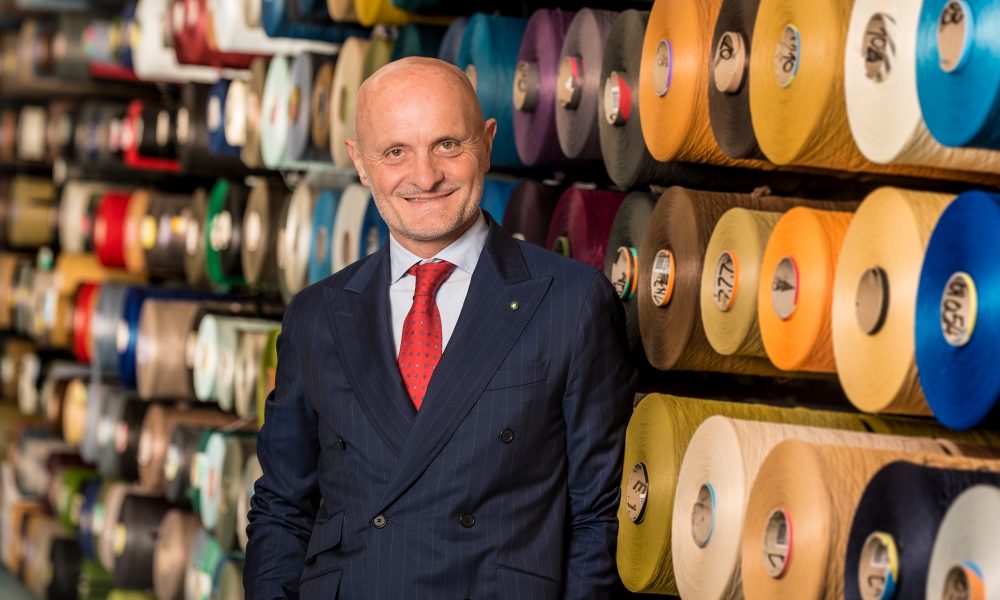

Today we’d like to introduce you to Giulio Bonazzi.
Thanks for sharing your story with us Giulio. So, let’s start at the beginning and we can move on from there.
I’ve always strongly believed that transforming our traditional business into a circular one is the only way to fulfill the challenges of a market that is rapidly changing. As one of the first companies in the world to apply the concept of the circular economy, it came naturally to Aquafil to study how to create sustainable ingredients with a smaller environmental impact. This meant producing our ECONYL® regenerated nylon from a completely different source (waste). A group of Aquafil employees came together with international universities and institutes to develop the idea of regenerating nylon waste to produce new nylon yarns.
That meant constructing the chemical plant and implementing a brand-new supply chain – a plant that is now running 24/7, 365 days of the year.
That is how the journey started, and in 2011 – after 5 years of research and development and 25 million euros invested – Aquafil inaugurated a plant in Slovenia dedicated to the production of ECONYL® regenerated nylon. At first, Aquafil produced ECONYL® with 70 percent pre-consumer and 30 percent post-consumer waste. Now, ECONYL® yarn is produced with a minimum of 50 percent post-consumer waste, bringing the company closer to its goal of using 100 percent post-consumer waste.
After realizing that nylon 6 could be endlessly regenerated, Aquafil researched waste that contained a high enough percentage of the material. They began with waste from its clients in the carpet sector. This collaboration was fundamental to developing the first stream of waste used for the production of ECONYL®. Several take-back programs were established to collect the face fibers from carpet (i.e. fluff).
Less obvious was the discovery that fishing nets are an excellent material for ECONYL®. After one of the many trips made by Aquafil’s reclaiming managers, they realized that used fishing nets could be a precious source of waste material, especially those coming from the fish farming industry. Later came other waste materials, such as plastic components and fabrics scraps, and Aquafil’s R&D team is constantly experimenting with new materials that might be suitable for regeneration.
Aquafil has been involved in the production of nylon 6 for more than 40 years, but it was not until the company launched its ECONYL® Regeneration System in 2011 that it proved nylon’s incredible capacity for closed-loop regeneration. Due to unique chemical properties, nylon 6 does not degrade in quality when appropriate recycling processes are applied, and it can be transformed back into raw material an infinite number of times. With this unique innovation, Aquafil was able to move beyond recycling to create a true circular process.
I’ve also done a TEDx talk about this topic and how the journey with ECONYL® started.
We’re always bombarded by how great it is to pursue your passion, etc – but we’ve spoken with enough people to know that it’s not always easy. Overall, would you say things have been easy for you?
When you are trying to revolutionize your supply chain, it is never a smooth road. This was the most difficult part. Having a plant that runs 24/7/365, we needed to create a stable source of waste to feed the system, and we needed to implement it in a sustainable way considering the Life Cycle Assessment (LCA) calculation we had in place.
No company can be sustainable alone; it is always a supply chain effort and many times, as it is our case, you are collaborating with companies and entities from outside your supply chain, as it is the case for the fishing industry. We are partnering with some companies in this industry for the recovery of fishing nets both abandoned and spent, and nets from the fish farming industry. Also, we are collaborating with some NGOs again for the fishing nets recovery (Healthy Seas and Net-Works™ initiatives).
Also, waste management legislation in EU is very challenging and complicated so when implementing such a new supply chain model, our company had to make sure to have all the right authorization for waste management and for waste shipping from all around the world to Slovenia.
Aquafil has supported the creation of a number of partnerships that involve NGOs and businesses to advance sustainability on a global scale. A prime example is the Healthy Seas Initiative, which is aimed at recovering and upcycling abandoned fishing nets from oceans. Aquafil founded this initiative with a European NGO and a sustainable apparel brand to promote the marine protection and reduce ocean pollution.
By feeding the recovered marine waste through the ECONYL® Regeneration System, abandoned fishing nets are not only recovered from our seas – they become a useful resource for sustainable product manufacturing. Since its Spring 2013 launch, Healthy Seas volunteers have conducted dozens of dives and recovered more than 375 tons of fishing nets within the initiative’s three pilot areas (the North Sea, Adriatic Seas and the Mediterranean Sea), garnering support from various brands within the fashion and carpet flooring industry.
Over the past couple of years, Aquafil has achieved a number of important sustainability milestones that further demonstrate its commitment to promoting a sustainable future. From launching the cross-sector Healthy Seas Initiative and from the creation of the brand new carpet recycling facility in Arizona to participating at events to explain the ECONYL® Regeneration System, Aquafil continues to drive its sustainability strategy forward.
So let’s switch gears a bit and go into the Aquafil story. Tell us more about the business.
Aquafil has been the leading manufacturer of nylon 6 for more than 40 years, both in Italy and globally. Aquafil is dedicated to environmental sustainability and produces the only nylon yarn of its kind with an infinite capacity for regeneration. Aquafil is headquartered in Arco, Italy, surrounded by mountains in a picturesque landscape near Lake Garda. It is this natural beauty that inspired Aquafil’s “sustainable DNA”.
Aquafil has 15 plants across three continents in eight countries: Italy, Slovenia, Croatia, Germany, United Kingdom, United States, Thailand and China. Aquafil’s U.S. plant in Georgia is dedicated to the production of yarns for the carpet sector and the new plant in Phoenix, Arizona, is dedicated to the recycling activities connected to the recovery of spent carpets.
The Aquafil Group consists of three key business units:
• Production of yarns for carpeting sector
• Production of yarns for the apparel sector
Aquafil integrates sustainability into its business strategy through a set of guidelines, called The Eco Pledge, which is the base of all of the Group’s operations. Aquafil’s Energy & Recycling Business Unit provides technical support to all of the Group’s activities, promoting the principles of sustainability within the Group and its stakeholders by focusing on energy saving and using recycled materials and renewable energy.
Since 2010, Aquafil has adopted the Life Cycle Assessment (LCA) method to measure the environmental performance of its products and identify the best opportunities for improvement. The LCA demonstrated that most of the environmental impacts generated by manufacturing result from the production of raw material.
This led to the development of the ECONYL® Regeneration System, which enables Aquafil to substitute non-renewable virgin raw materials with secondary raw materials made of recycled waste product, such as fishing nets and carpet fluff. The system guarantees significant environmental benefits, as it reduces greenhouse gas emissions and recycles tons of waste that would otherwise end up in the landfill.
Aquafil found that with the ECONYL® regeneration process Global Warming Potential is reduced for up to 80%* if compared with Aquafil standard raw material obtained from crude oil.
In addition, for every 10,000 tons of ECONYL® raw material produced*:
• 70,000 barrels of crude oil are saved
• 57,000 tons of CO2 eq. emissions are avoided
*Numbers derived from EPD for ECONYL Polymer ver. 4.10.2017 (and its background LCA report). With the aim of improving the environmental performance of ECONYL® even further, the Group started a collaboration with its suppliers to develop the ECONYL® Qualified Protocol, whose requirements have to be fulfilled by all the companies that wish to supply Aquafil with goods or services for manufacturing ECONYL® yarn.
Aquafil does not consider other sustainable ingredient producers as competitors because everyone must contribute in order to create a more sustainable fashion industry. One contribution Aquafil makes is giving life to old materials that are otherwise destined for the landfill. ECONYL® is state-of-the-art because it can be regenerated not just once, but an infinite number of times. In this way, ECONYL® takes the concept of the circular economy to an exciting new level.
Global fiber consumption is expected to reach 96.4 million tons in 2020 (a 30 percent increase since 2010), and it is apparent that the linear waste stream in which products are manufactured, consumed and disposed of is no longer sustainable. As a result of this, manufacturers are decreasing the amount of raw materials used in production, and instead seeking new sources of recycled or upcycled materials.
While traditional recycling processes can result in degradation, Aquafil’s unique regeneration system upcycles waste by transforming it back to its raw state without any loss in quality. For this reason, designers can use fabric made with ECONYL® without sacrificing beauty for sustainability.
The response thus far has been overwhelmingly positive. The market is becoming more intrigued, and the demand for sustainable products is higher than ever. Many fashion designers and textile manufacturers are enthusiastic about the idea of using sustainable ingredients in their collections. They choose ECONYL® for both its outstanding environmental features and the compelling story behind it.
To date, ECONYL® has been used by around 270 brands in the fashion world, among them: Kelly Slater’s Outerknown, Speedo, Adidas, Stella McCarthy, Volcom, and more. It was also featured at the Global Green Pre-Oscar Party in 2015 and at the latest CFDA Awards in NYC (with a special red carpet). This diversity of brands is a testament to the broad applicability of ECONYL®.
Contact Info:
- Address: 1 Aquafil Drive, Cartersville, GA 30120
- Website: www.aquafil.com
- Phone: Cartersville – 678.605.8100
- Email: info@aquafil.com
- Instagram: https://www.instagram.com/econylbrand/
- Facebook: https://www.facebook.com/econylbrand/
- Twitter: https://twitter.com/econyl
- Other: https://www.linkedin.com/showcase/econyl%C2%AE/










Getting in touch: VoyageATL is built on recommendations from the community; it’s how we uncover hidden gems, so if you know someone who deserves recognition please let us know here.



















